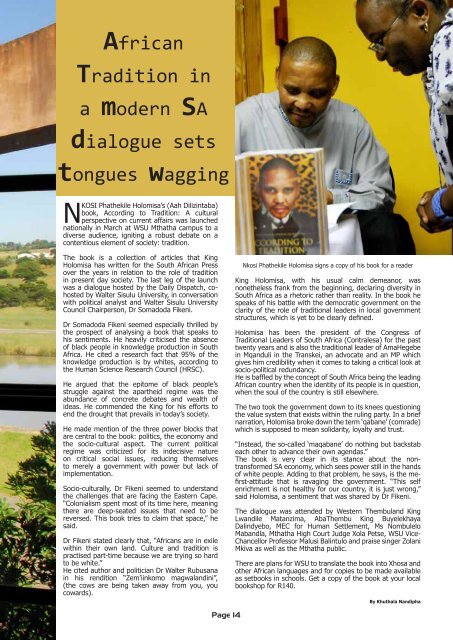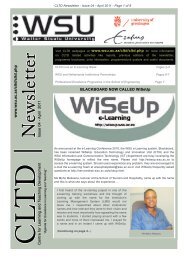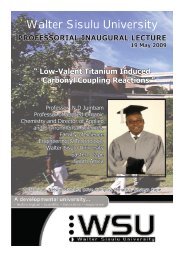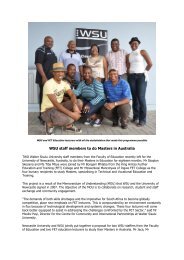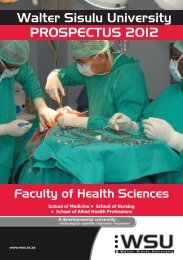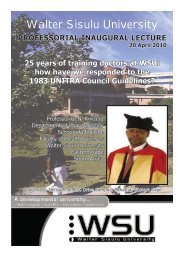The Insider - Walter Sisulu University
The Insider - Walter Sisulu University
The Insider - Walter Sisulu University
You also want an ePaper? Increase the reach of your titles
YUMPU automatically turns print PDFs into web optimized ePapers that Google loves.
African<br />
Tradition in<br />
a modern SA<br />
dialogue sets<br />
tongues wagging<br />
NKOSI Phathekile Holomisa’s (Aah Dilizintaba)<br />
book, According to Tradition: A cultural<br />
perspective on current affairs was launched<br />
nationally in March at WSU Mthatha campus to a<br />
diverse audience, igniting a robust debate on a<br />
contentious element of society: tradition.<br />
<strong>The</strong> book is a collection of articles that King<br />
Holomisa has written for the South African Press<br />
over the years in relation to the role of tradition<br />
in present day society. <strong>The</strong> last leg of the launch<br />
was a dialogue hosted by the Daily Dispatch, cohosted<br />
by <strong>Walter</strong> <strong>Sisulu</strong> <strong>University</strong>, in conversation<br />
with political analyst and <strong>Walter</strong> <strong>Sisulu</strong> <strong>University</strong><br />
Council Chairperson, Dr Somadoda Fikeni.<br />
Dr Somadoda Fikeni seemed especially thrilled by<br />
the prospect of analysing a book that speaks to<br />
his sentiments. He heavily criticised the absence<br />
of black people in knowledge production in South<br />
Africa. He cited a research fact that 95% of the<br />
knowledge production is by whites, according to<br />
the Human Science Research Council (HRSC).<br />
He argued that the epitome of black people’s<br />
struggle against the apartheid regime was the<br />
abundance of concrete debates and wealth of<br />
ideas. He commended the King for his efforts to<br />
end the drought that prevails in today’s society.<br />
He made mention of the three power blocks that<br />
are central to the book: politics, the economy and<br />
the socio-cultural aspect. <strong>The</strong> current political<br />
regime was criticized for its indecisive nature<br />
on critical social issues, reducing themselves<br />
to merely a government with power but lack of<br />
implementation.<br />
Socio-culturally, Dr Fikeni seemed to understand<br />
the challenges that are facing the Eastern Cape.<br />
“Colonialism spent most of its time here, meaning<br />
there are deep-seated issues that need to be<br />
reversed. This book tries to claim that space,” he<br />
said.<br />
Dr Fikeni stated clearly that, “Africans are in exile<br />
within their own land. Culture and tradition is<br />
practised part-time because we are trying so hard<br />
to be white.”<br />
He cited author and politician Dr <strong>Walter</strong> Rubusana<br />
in his rendition “Zem’iinkomo magwalandini”,<br />
(the cows are being taken away from you, you<br />
cowards).<br />
Page 14<br />
Nkosi Phathekile Holomisa signs a copy of his book for a reader<br />
King Holomisa, with his usual calm demeanor, was<br />
nonetheless frank from the beginning, declaring diversity in<br />
South Africa as a rhetoric rather than reality. In the book he<br />
speaks of his battle with the democratic government on the<br />
clarity of the role of traditional leaders in local government<br />
structures, which is yet to be clearly defined.<br />
Holomisa has been the president of the Congress of<br />
Traditional Leaders of South Africa (Contralesa) for the past<br />
twenty years and is also the traditional leader of AmaHegebe<br />
in Mqanduli in the Transkei, an advocate and an MP which<br />
gives him credibility when it comes to taking a critical look at<br />
socio-political redundancy.<br />
He is baffled by the concept of South Africa being the leading<br />
African country when the identity of its people is in question,<br />
when the soul of the country is still elsewhere.<br />
<strong>The</strong> two took the government down to its knees questioning<br />
the value system that exists within the ruling party. In a brief<br />
narration, Holomisa broke down the term ‘qabane’ (comrade)<br />
which is supposed to mean solidarity, loyalty and trust.<br />
“Instead, the so-called ‘maqabane’ do nothing but backstab<br />
each other to advance their own agendas.”<br />
<strong>The</strong> book is very clear in its stance about the nontransformed<br />
SA economy, which sees power still in the hands<br />
of white people. Adding to that problem, he says, is the mefirst-attitude<br />
that is ravaging the government. “This self<br />
enrichment is not healthy for our country, it is just wrong,”<br />
said Holomisa, a sentiment that was shared by Dr Fikeni.<br />
<strong>The</strong> dialogue was attended by Western <strong>The</strong>mbuland King<br />
Lwandile Matanzima, Aba<strong>The</strong>mbu King Buyelekhaya<br />
Dalindyebo, MEC for Human Settlement, Ms Nombulelo<br />
Mabandla, Mthatha High Court Judge Xola Petse, WSU Vice-<br />
Chancellor Professor Malusi Balintulo and praise singer Zolani<br />
Mkiva as well as the Mthatha public.<br />
<strong>The</strong>re are plans for WSU to translate the book into Xhosa and<br />
other African languages and for copies to be made available<br />
as setbooks in schools. Get a copy of the book at your local<br />
bookshop for R140.<br />
By Khuthala Nandipha


